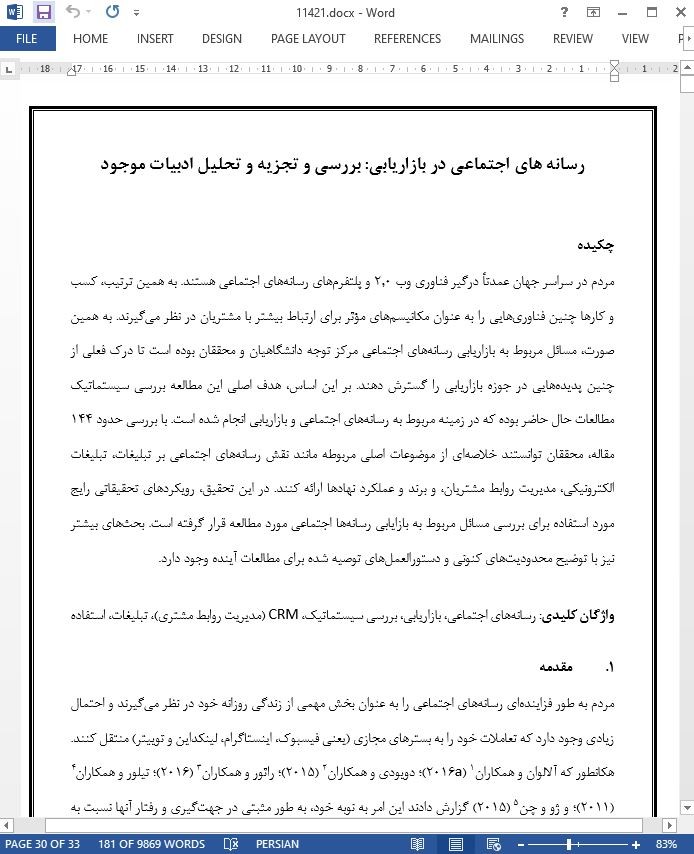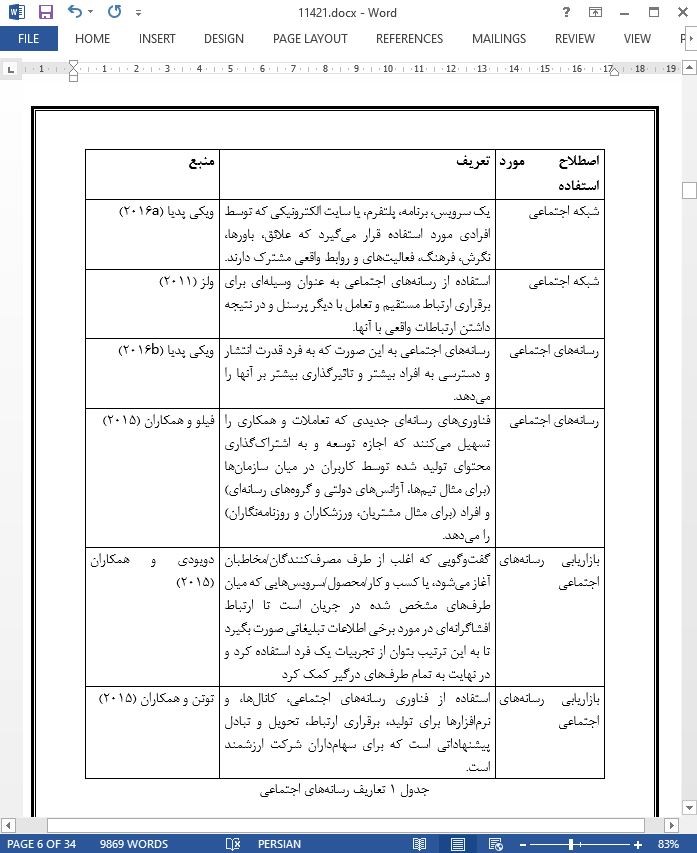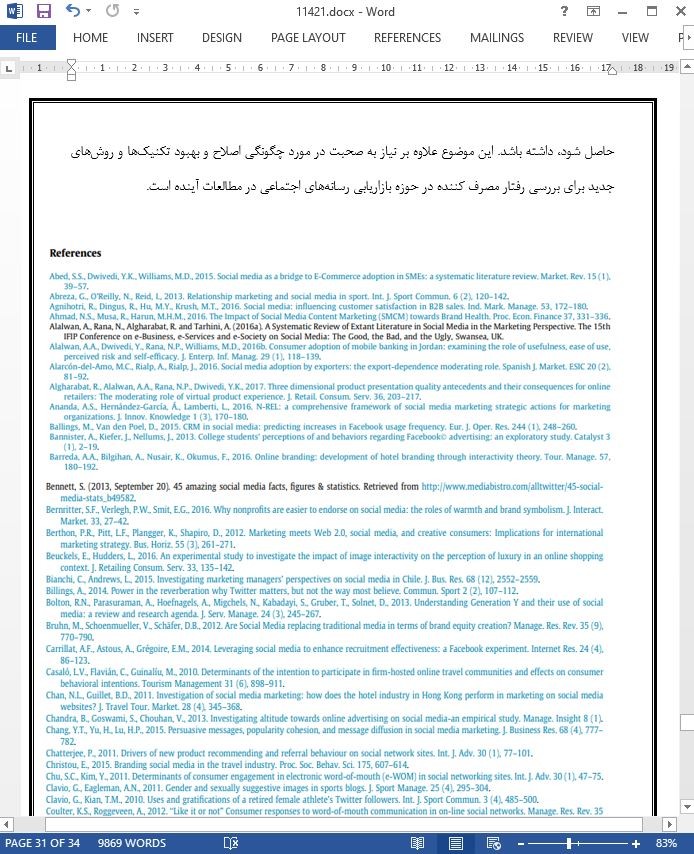
رسانه های اجتماعی در بازاریابی: بررسی و تجزیه و تحلیل ادبیات موجود
چکیده
مردم در سراسر جهان عمدتاً درگیر فناوری وب 2.0 و پلتفرمهای رسانههای اجتماعی هستند. به همین ترتیب، کسب و کارها چنین فناوریهایی را به عنوان مکانیسمهای مؤثر برای ارتباط بیشتر با مشتریان در نظر میگیرند. به همین صورت، مسائل مربوط به بازاریابی رسانههای اجتماعی مرکز توجه دانشگاهیان و محققان بوده است تا درک فعلی از چنین پدیدههایی در جوزه بازاریابی را گسترش دهند. بر این اساس، هدف اصلی این مطالعه بررسی سیستماتیک مطالعات حال حاضر بوده که در زمینه مربوط به رسانههای اجتماعی و بازاریابی انجام شده است. با بررسی حدود 144 مقاله، محققان توانستند خلاصهای از موضوعات اصلی مربوطه مانند نقش رسانههای اجتماعی بر تبلیغات، تبلیغات الکترونیکی، مدیریت روابط مشتریان، و برند و عملکرد نهادها ارائه کنند. در این تحقیق، رویکردهای تحقیقاتی رایج مورد استفاده برای بررسی مسائل مربوط به بازایابی رسانهها اجتماعی مورد مطالعه قرار گرفته است. بحثهای بیشتر نیز با توضیح محدودیتهای کنونی و دستورالعملهای توصیه شده برای مطالعات آینده وجود دارد.
1. مقدمه
مردم به طور فزایندهای رسانههای اجتماعی را به عنوان بخش مهمی از زندگی روزانه خود در نظر میگیرند و احتمال زیادی وجود دارد که تعاملات خود را به بسترهای مجازی (یعنی فیسبوک، اینستاگرام، لینکداین و توییتر) منتقل کنند. هکانطور که آلالوان و همکاران (a2016)؛ دویودی و همکاران (2015)؛ راثور و همکاران (2016)؛ تیلور و همکاران (2011)؛ و ژو و چن (2015) گزارش دادند این امر به نوبه خود، به طور مثبتی در جهتگیری و رفتار آنها نسبت به انواع فناوری رسانههای اجتماعی منعکس شده است. بنابراین، برنامههای رسانههای اجتماعی به عنوان یکی از موثرترین و تاثیرگذارترین مفاهیم بوده است که در بیشتر جنبههای زندگی افراد حضور دارد (به عبارت دیگر، زندگی اجتماعی، زندگی تبلیغاتی، زندگی تجاری، بخش آموزشی، زندگی سیاسی، (الالوان و همکاران، a2016؛ القرابات و همکاران ، 2017؛ عابد و همکاران ، 2015؛ هاوکینز و ول ، 2013؛ هینز و همکاران ، 2011؛ راثور و همکاران، 2016؛ آشر و همکاران ، 2014؛ زنگ و گریتسن ، 2014؛ ژو و چن، 2015).
6. محدودیتها و راهنماییهایی برای مطالعات آینده
تمرکز این مطالعه صرفاً بر متون اصلی رسانههای اجتماعی در زمینه بازاریابی بوده و قسمت بزرگی از مطالعات که در زمینههای مختلف مانند آموزش، سیاست، محیطهای اجتماعی-فرهنگی صورت گرفته را در نظر نمیگیرد. بنابراین در نظر گرفتن این مطالعات که در زمینههای مختلف انجام شده برای تحقیقات آینده مفید است. با وجود اینکه این مطالعه با اسکن نظری متون اصلی ادبیات در این زمینه کمک کننده است، همچنان نیاز به شواهد آماری از طریق انجام آنالیز پیشرفته حس میشود، به ویژه با توجه به وجود مطالعات کمی که در زمینه بازاریابی رسانههای اجتماعی وجود دارد. محققان باید تلاش بیشتری در مورد چگونگی رفتار متفاوت این پدیده در پلتفرمهای مختلف؛ کشورهای مختلف (توسعه یافته، در حال ظهور، در حال توسعه)؛ فرهنگهای متفاوت (جمعگرا در مقابل فردگرا)؛ و زمینههای مختلف (گردشگری، ورزشی، دولتی) انجام دهند. باوجود این حقیقت که این مطالعه به طور جامع به بررسی ابعاد اصلی تحت پوشش در مطالعات پیشین میپردازد، به درستی عوامل اصلی و نحوه تاثیرگذاری آنها بر یکدیگر را در نظر نمیگیرد (کدام پیش قدم و کدام نتیجه دیگری است).
Abstract
People worldwide are largely engaged and attached with the web 2.0 technology and Social media platforms. By the same token, businesses start looking at such technologies as effective mechanisms to interact more with their customers. Equally, the related issues of social media marketing have been also the focus of attention for academics and researchers to expand the current understanding about such phenomena over the marketing area. Accordingly, the main aim of this study is to systematically examine and review the current studies that have conducted over the related area of social media and marketing. By reviewing approximately 144 articles, the researchers were able to provide an overview of the main themes and trends covered by the relevant literature such as the role of social media on advertising, the electronic word of mouth, customers’ relationship management, and firms’ brands and performance. In this review, it has also studied the most common research approaches adopted to examine the related issues of social media marketing. Further discussion is also introduced followed by an explanation of the current review limitations and recommended directions to be examined by future studies.
1. Introduction
People increasingly look at social media applications as an important part of their daily life and more likely to move their interactions to the virtual platforms (i.e. Facebook, Instagram, LinkedIn and Twitter). This, in turn, positively reflect on their orientations and behaviours toward all kinds of social media technology as reported by Alalwan et al. (2016a), Dwivedi et al. (2015), Rathore et al. (2016), Taylor et al. (2011), Zhu and Chen (2015). Therefore, social media applications have been observed as one of the most efficient and influential implications that have been progressively engaged in most aspects of people’s lives (i.e. social life, commercial life, business life, educational sector, political life) (Alalwan et al., 2016a; Algharabat et al., 2017; Abed et al., 2015; Hawkins and Vel, 2013; Hinz et al., 2011; Rathore et al., 2016; Usher et al., 2014; Zeng and Gerritsen, 2014; Zhu and Chen, 2015).
6. Limitations and future research directions
The focus of the current study was exclusively on the main body of literature of social media in the marketing context while it was ignored large part of studies that have conducted over different areas such as education, political, sociocultural environments. Thus, it could be worth considering these studies conducted over different areas by future studies. Even though this study does a contribution by theoretically scan the main body of literature, there is still a need for statistical evidences from these studies by conducting a meta-analysis study especially in the light of the fact that there is a good of number of quantitative studies that have conducted over the area of social media marketing. As a new trend and topic, researchers need to spend more efforts on how such phenomenon could behave different from platform to another; over different countries (i.e. developed, emerging, developing); cultures (i.e. collectivism versus individualism); and different contexts (i.e. tourism, sports, governmental).
چکیده
1. مقدمه
2. مفهوم رسانههای اجتماعی
3. روش تحقیق
3.1 رسانههای اجتماعی و تبلیغات
3.2 رسانههای اجتماعی و تبلیغات الکترونیکی (e-WOM)
3.3 رسانههای اجتماعی و مدیریت روابط مشتری (CRM)
3.4 رسانههای اجتماعی و برند
3.5 رسانههای اجتماعی و درک و رفتار مشتری
3.6 رسانههای اجتماعی از منظر سازمانی
3.7 استفاده از رسانههای اجتماعی
4. روشهای مورد استفاده در بررسی نقش رسانههای اجتماعی در زمینه بازاریابی
5. بحث و گفتگو
6. محدودیتها و راهنماییهایی برای مطالعات آینده
Abstract
1. Introduction
2. Social media concept
3. Research method
3.1. Social media and advertising
3.2. Social media and electronic word of mouth (e-WOM)
3.3. Social media and customer relationship management (CRM)
3.4. Social media and brand
3.5. Social media and customer behaviour and perception
3.6. Social media from the organizations’ perspective
3.7. Adoption of social media
4. Methods adopted in examining the role of social media in the marketing context
5. Discussion
6. Limitations and future research directions
- اصل مقاله انگلیسی با فرمت ورد (word) با قابلیت ویرایش
- ترجمه فارسی مقاله با فرمت ورد (word) با قابلیت ویرایش، بدون آرم سایت ای ترجمه
- ترجمه فارسی مقاله با فرمت pdf، بدون آرم سایت ای ترجمه



